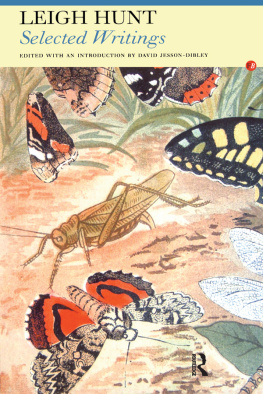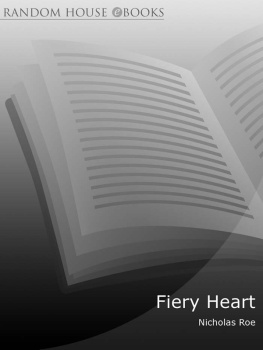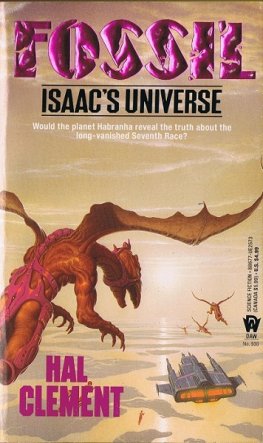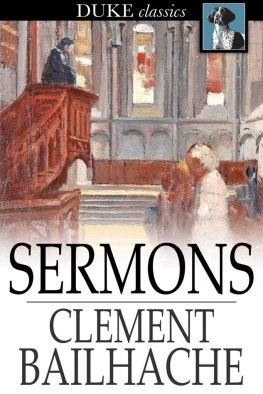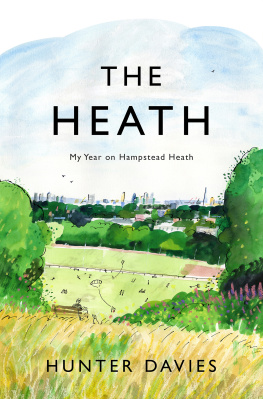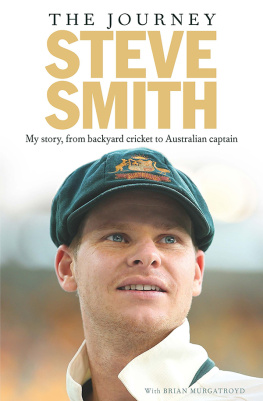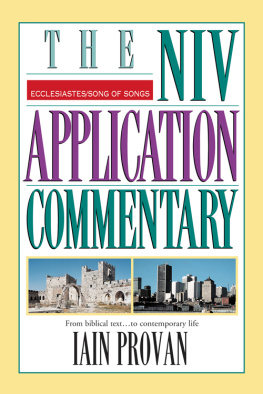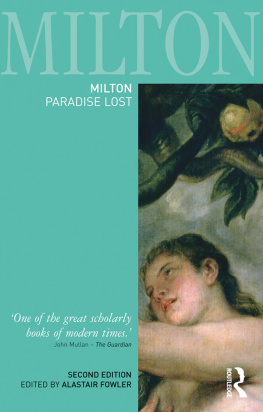SELECTED WRITINGS
JAMES LEIGH HUNT was born in Middlesex in 1784 and educated at Christs Hospital School. His first book of poems appeared when he was seventeen. In 1808 he and his brother founded a radical weekly paper, The Examiner. An allegedly libellous article published in the paper about the Prince Regent led to a heavy fine and two years imprisonment for the brothers. Hunts wife joined him in prison, from where he continued to edit the paper. Hunts circle of friends included Byron, Hazlitt and Lamb and he promoted the work of Keats and Shelley in The Examiner. In 1821 he travelled to Italy to join Byron and Shelley in launching a new periodical, The Liberal. Only four issues were published and he returned to London in 1825. Lord Byron and his Contemporaries (1828), an unflattering appraisal that made him unpopular, was based on that experience. In addition to poetry and journalism, Hunts works include volumes of literary criticism, plays, a devotional work, and his Autobiography (1850). He died in 1859.
DAVID JESSON-DIBLEY was the Head of English at Christs Hospital School before his retirement. He subsequently became a freelance lecturer in English literature, chiefly for the Extra-Mural Department of London University. He is a longstanding member of the Friends of S.T. Coleridge.
FyfieldBooks aim to make available some of the great classics of British and European literature in clear, affordable formats, and to restore often neglected writers to their place in literary tradition.
FyfieldBooks take their name from the Fyfield elm in Matthew Arnolds Scholar Gypsy and Thyrsis. The tree stood not far from the village where the series was originally devised in 1971.
Roam on! The light we sought is shining still.
Dost thou ask proof? Our tree yet crowns the hill,
Our Scholar travels yet the loved hill-side
from Thyrsis
LEIGH HUNT
Selected Writings
Edited with an introduction by
DAVID JESSON-DIBLEY
Published in USA and Canada in 2003 by
Routledge
711 Third Avenue, New York, NY 10017
Routledge is an imprint of the Taylor & Francis Group, an informa business
By arrangement with Carcanet Press Ltd.
First published in 1990 by Carcanet Press Ltd
This impression 2003
Selection, introduction and editorial matter Copyright DavidJesson-Dibley 1990, 2003
The right of David Jesson-Dibley to be identified as the editor of this work has been asserted by him in accordance with the Copyright, Designs and Patents Act of 1988
All rights reserved
Cataloguing-in-Publication data is available from the Library ofCongress.
ISBN 0-415-96951-4
All rights reserved. No part of this book may be reprinted or reproduced or utilized in any form or by any electronic, mechanical or other means, now known or hereafter invented, including photocopying and recording or in any information storage or retrieval system, without permission in writing from the publishers.
Contents
From Lord Byron and Some of His Contemporaries:
Lord Byron
From The Examiner:
Rules for the Conduct of Newspaper Editors
From The Indicator
A Now: descriptive of a hot day
James Leigh Hunt was born in Southgate on 19 October 1784 and died in Putney on 28 August 1859. He was named after James Henry Leigh, nephew of the 3rd Duke of Chandos, to whom his father, Isaac Hunt, a popular preacher, was a tutor.
Following eight years as a pupil at Christs Hospital School in the City of London, and the publication of his Juvenilia, which his father saw through four editions, Leigh Hunt began a life-time career of journalism in 1805, making his precocious mark as a writer of theatrical criticism in The News, edited by his brother, John. In 1808, the brothers launched their best known weekly paper, The Examiner, with an editorial stance of liberal reform.
A year later, Hunt married Marianne Kent. Seven of their eleven children reached adulthood. Of these, the eldest, Thornton, published a collection of his fathers letters after his death. The youngest, Vincent, Leigh Hunts favourite, died seven years before his father at the age of thirty-one.
In 1813 and for the next two years, Hunt and his brother were obliged to edit The Examiner from separate gaols and to pay fines of 500 each for Hunts alleged libel upon the Prince Regent. Hunts wife and baby daughter were permitted to join him in Surrey gaol, where he seems to have been comfortably accommodated with wallpaper of his own choosing, his piano, and unlimited visits from admirers and friends, including Byron, Thomas Moore, Hazlitt and Lamb. Before his release he had written the greater part of his longest poem, The Story of Rimini, and a masque celebrating the downfall of Napoleon, Descent of Liberty.
The next three years were spent in Hampstead, where Hunt established his friendship with Shelley and Keats, commending their poetry to readers of The Examiner in 1816. In 1819, Hunt wrote a further appreciation of Keatss poetry for The Indicator, a weekly that Hunt sustained for a year and a half. In the same year, Shelley, of all Hunts friends the most admired, dedicated The Cenci to him.
By 1821, the year in which Shelley and Byron invited him to Italy to launch a quarterly magazine, Hunts reputation was at its peak amongst his own contemporaries, as poet, essayist, writer of political journalism, biographical sketches and literary criticism. His concern then, as throughout his career, was to refine the literary tastes of his readers, to cultivate their sensibilities and to extend their social sympathies. After a much delayed sea voyage, requiring Hunt and his family to winter in Plymouth, Hunt reached Leghorn on 1 July 1822, a week before Shelley was drowned.
The proposed quarterly, The Liberal, survived for four issues only. Relations between Hunt and Byron cooled and, after residing in Florence, in 1825 Hunt brought his family back to England and a series of lodgings in London. Eventually they settled in Upper Cheyne Row, Chelsea, where they were neighbours and friends of Thomas and Jane Carlyle from 1833 to 1840.
These were years of indigence and domestic disorder. Hunt was not in the best of health and his reputation had suffered through the publication of a candid appraisal of Byron, based on personal experience, in Lord Byron and his Contemporaries. Twenty years later, he was to stand by his myth-undermining observations, though conceding that their publication had been ill-timed.
Hunts Collected Poems were published in 1832 and in 1844, the year in which he published his most substantial works of literary criticism, Imagination and Fancy and the essay, What is Poetry? By then he was almost at the end of his versatile though not very distinguished career as a poet. He had shown himself to be a modest innovator in narrative style with a commentators keen eye for detail, a vigorous slapdash writer of burlesque and satire, a competent sonneteer, an easy exponent of conversational epistolary verse and an able translator of Greek, Roman, Italian and French poetry. In Rossettis judgement, he was the greatest translator England had produced . In addition, he had turned his hand to playwriting with A Legend of Florence, a verse drama staged with success at Covent Garden in 1840 and revived ten years later at Sadlers Wells and, by royal command, at WindsorCastle. His late comedy, Lovers Amazements, was performed at the Lyceum in 1858, and seemed set for success, but the theatre went bankrupt.

